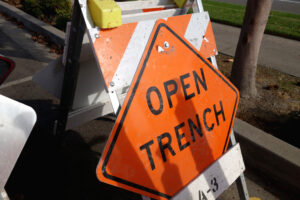Macon, Georgia, plumbing contractor Pyles Plumbing and Utility Contractors Inc. faces $308,125 in Occupational Safety and Health Administration (OSHA) penalties following a fatal trench collapse that claimed the life of a 20-year-old worker and hospitalized another, the agency announced February 29.
OSHA investigators learned that on August 10, 2023, two employees were installing sewer-line piping in a trench when the trench’s side collapsed. One worker suffered fatal injuries, and another employee was hospitalized due to fractures from the cave-in.
The agency cited the employer for two willful violations for not providing trench shields in accordance with all specifications, recommendations, and limitations issued by the manufacturer and neglecting to put in place a safe means to exit a trench box. Investigators also cited the employer with three serious violations for allowing employees to work inside a trench with defective trench shields and without head protection and for failing to train employees to recognize and avoid hazards while working inside a trench.
“This employer has over 20 years of experience in excavation, so they are well aware that that the work they do can be dangerous if safety protocols are disregarded,” said Joshua Turner, OSHA’s Atlanta-East area office director, in an agency statement.
Trench collapses are among the construction industry’s most lethal hazards, according to OSHA.
In July 2022, the agency unveiled plans for 1,000 inspections in response to an uptick in trenching and excavation fatalities, and OSHA has an ongoing National Emphasis Program (NEP) addressing trenching and excavation hazards. Agency compliance safety and health officers (CSHO) may stop by and inspect any excavation site they encounter during their daily duties.
Wisconsin manufacturer facing repeat violations, $269K in fines
OSHA cited WD Flooring LLC, a Laona, Wisconsin, hardwood flooring manufacturer, for 4 repeat, 28 serious, and 6 other-than-serious violations, with a proposed penalty of $269,662, the agency announced March 1.
OSHA inspectors opened a safety inspection on September 5, 2023, at WD Flooring under the agency’s NEP for amputation hazards. Inspectors opened a concurrent health inspection that noted deficiencies in the employer’s hearing conservation program and a lack of training and information provided to employees about hazardous chemicals in the workplace.
Agency investigators found that WD Flooring failed to:
- Use required lockout/tagout procedures.
- Train workers in lockout/tagout procedures.
- Install adequate guarding to protect workers from contact with operating machine parts on belts, chains, pulleys, rollers, shafts, sprockets, upcut saws, and woodworking presses.
- Protect workers from fall hazards.
- Repair forklifts.
- Operate forklifts safely.
- Provide adequate personal protective equipment (PPE).
- Protect workers from electrical hazards.
- Implement a hearing conservation program, including training and hearing protection.
- Record injuries in a timely manner.
- Train employees on the hazards associated with chemicals in the workplace.
“Each year, hundreds of workers are injured in manufacturing facilities because their employer fails to implement machine safety procedures and train workers on safe operation,” Robert Bonack, OSHA’s Appleton, Wisconsin, area office director, said in a statement.
In 2019, OSHA issued a revised directive for its NEP related to amputations in manufacturing. The update to a 2015 directive covers facilities within the fabricated metal product, food, furniture and related product, machinery, nonmetallic mineral product, paper, plastics and rubber, primary metal, transportation equipment, and wood product manufacturing subsectors.
Last fall, OSHA announced its top 10 most cited standards for fiscal year (FY) 2023, which included several cited at WD Flooring: hazard communication (29 Code of Federal Regulations (CFR) §1910.1200), powered industrial trucks (§1910.178), lockout/tagout (§1910.147), and machine guarding (§1910.212).

